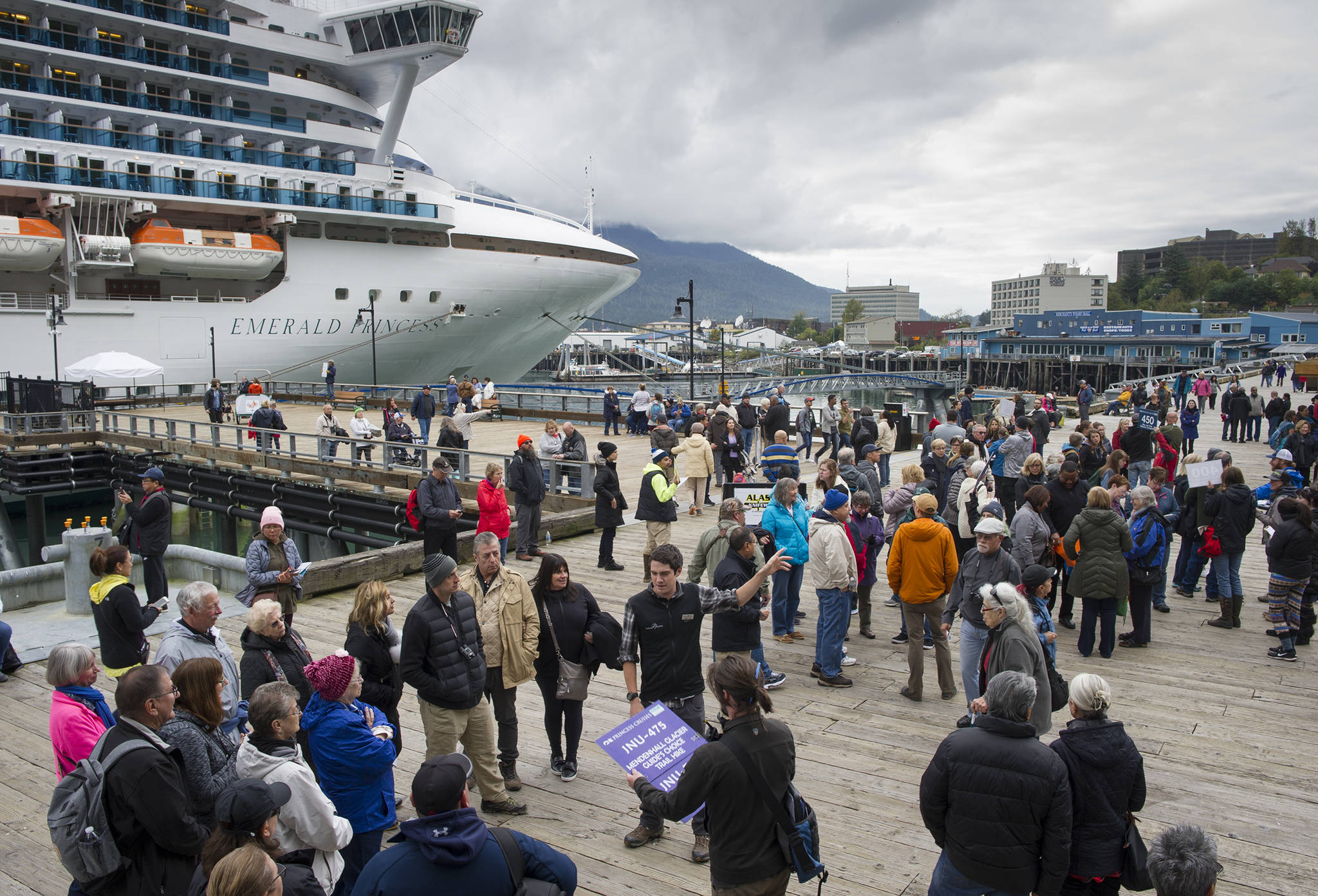The lawsuit between the City of Juneau and the cruise industry has hung heavily over the city for more than two years, and it won’t be resolved any time soon.
Attorneys from both sides argued their cases in front of U.S. District Judge H. Russel Holland at the Robert Boochever U.S. Courthouse in Juneau on Tuesday morning, but Holland declined to make any decision on the case.
“We will be a while in getting you a decision,” Holland said after about two hours of arguments. “This is not a simple decision.”
The lawsuit began in April 2016, when Cruise Lines International Association’s (CLIA) Alaska affiliate announced it was suing the city. CLIA’s lawsuit alleged that the City and Borough of Juneau misused funds from marine passenger fees and port development fees — taxes that each passenger pays for coming to Juneau.
These fees, CLIA asserted, were being used for CBJ projects that did not directly benefit the cruise ships coming through Juneau. In court Tuesday, CLIA’s attorney Jonathan Benner asserted that this is a violation of the U.S. Constitution’s Tonnage Clause. In essence, Benner said, the Tonnage Clause prohibits states from charging for a vessel’s cargo without providing a service to the boat.
“It’s a revenue stream that the city has created that it’s redispensing as it sees fit,” Benner said in an interview afterward. “We believe that just blows a big hole in the Constitution.”
Bob Blasco, the attorney representing the CBJ, has been arguing that passenger fees can be spent on services for the passengers, not just for the vessel. On Tuesday, Blasco said CLIA’s attorneys have not been clear enough about which specific expenditures they find to be violating the Tonnage Clause. Blasco also said he doubted that James Madison had cruise ships in mind when forbidding states to charge based on a ship’s cargo.
In the original complaint, CLIA pointed to the construction of an artificial island for Juneau’s whale statue as an example of a violation, asserting that it was too far away from the cruise docks to serve the passengers.
The statue only briefly came up Tuesday, and Benner did not mention specific expenditures that the city had made. In fact, Benner said CLIA doesn’t want any reimbursement for any past expenditures the city has made with passenger fee revenue. He said they just want Holland to make a ruling and set a precedent for future cases that might be similar. Both attorneys agreed that this case is different from others in the past that deal with the Tonnage Clause. Blasco referred to multiple cases where judges ruled on specific expenditures and whether they were in violation of the clause. In this case, Blasco pointed out, CLIA isn’t pointing at certain expenses on the city’s part.
“They have not identified which actual expenditures they claim to be unlawful,” Blasco said in court, “and so we are put in the position of saying, ‘Well, your honor, we don’t know what they’re claiming to be unlawful. The ones that they agreed to, the ones that they requested, those cannot be any kind of violation of the Tonnage Clause.’”
Blasco presented a list of expenditures that cruise line executives have requested and signed off on, including paying for crossing guards, restroom cleaning and construction of the Seawalk.
John Binkley, president of CLIA Alaska, was seated in the front row and listened attentively to the arguments. He said in an interview afterward that he has written numerous letters to the CBJ contesting some of the expenditures. Binkley’s name did not appear on either of Blasco’s displays about cruise line executives who have requested or signed off on projects.
Benner said a case like this has never been tried because, in his view, no municipality has taken passenger fees and used them for non-cruise purposes.
“All the case law development over two centuries was about situations where fees were being extracted for different kinds of uses,” Benner said. “As far as I’m aware, this is the first and only situation in which a city’s just trying to create a revenue stream out of it.”
CBJ officials have repeatedly asserted that the city has only used funds for projects that serve cruise passengers, and an opinion piece in the Empire from City Manager Rorie Watt in January asserted that without the CBJ’s strategically planned expenditures, “the cruise ship industry would have been unable to grow to its current level of local visitation.”
The cruise industry has been a boon to Juneau’s economy in recent years, as the amount of cruise ship visitors per summer has increased by 50 percent since 2010. According to a presentation of Binkley’s at Southeast Conference’s Mid-Session Summit this February, CLIA projects 1.31 million people will come through Alaska on cruise ships in 2019, and almost all of them come through Juneau.
People of all walks of life, including celebrities, come through Juneau due to the cruise industry. There has been an expansive amount of discovery filed in this case, including an Instagram post from Oprah Winfrey dated July 16, 2017. The post shows a video that Winfrey took of an eagle on a tree near the Seawalk, and Blasco mentioned it in court as an example of exposure that Juneau has gotten from improvements to the Seawalk, which was funded in part by passenger fees.
• Contact reporter Alex McCarthy at 523-2271 or amccarthy@juneauempire.com. Follow him on Twitter at @akmccarthy.


